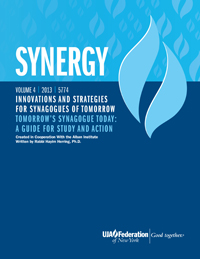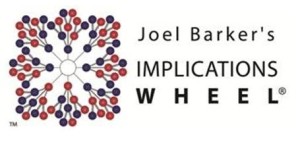In 2000, I wrote a paper called Network Judaism, later published in 2001. MySpace was launched in August 2003 and Facebook in February 2004. While not long ago at all, it’s hard to recall that social media platforms didn’t exist. But if you were tracking possible significant trends carefully, you could anticipate the potential emergence of the networked organization. What no one was able to grasp was how social media sites would be enable societal changes of major magnitude.
Today, here are a few stats on some popular social media platforms:
Facebook-1.15 billion registered users
Flickr -87 million users, 8 billion photos
Pandora – 200 million registered users
Twitter – 500 million registered
Word Press – 66 million blogs
Angie’s list – 2 million users
Yelp – 12 million users per day
YouTube-500 million visits per day
The numbers tell a story of how rapidly socially media sites have been adopted and how embedded they are in our lives. Yet, synagogues, federations and other historic organizations have not shifted their structures to enable themselves to become platforms for people to connect socially, spiritually, philanthropically and educationally.
As we are now in the networked era, Jewish organizations need to shift their paradigms to a platform model. Otherwise, the great the work that many are doing around making Judaism more relevant, inspirational, meaning-saturated and beautiful will be inhibited or fail. Unlike many Jewish start up organizations that have blossomed over the last ten years, established Jewish organizations need Platform Judaism, or more accurately, platform Jewish structures.
What is an organizational platform (and I can highlight only a few dimensions in this space)? A platform is an enabling space for people to interact and act upon issues. An organization that becomes a platform enables individuals to self direct their Jewish choices and express their Jewish values within the organization’s mission. That is a radical shift from organizational leaders directing people how, when, where, why and with whom to be Jewish- in other words, the dominant paradigm of more established Jewish organizations and synagogues!
Becoming a platform is also a mindset. It means embracing the desire of individuals to co-create their experiences, opt in and opt out of Jewish life, do new things and old things in new ways-of course, within the organization’s mission. This mindset operates within the building, outside of the building, on the website, and anywhere else. It also requires a much more creative and intentional use of technologies to tell individual stories and organizational stories and a redefinition of professional and volunteer leaders’ roles, new governance models and even new professional and volunteer positions.
Most critically, restructuring as a platform requires a relentless focus on a compelling mission and purpose. When organizations can clearly define their purpose, they have the opportunity to help individuals activate their latent hunger for community, experientially educate them about the difference between a discrete cause and an enduring commitment and provide opportunities for deeper relationships that transcend Facebook-type “connections.”
Talking about organizational structure isn’t sexy. But the payoff for paying attention to it is potentially huge, enabling:
- deeper and broader connections
- deeper and broader meaning
- deeper and broader impact.
In part, I wrote my book, Tomorrow’s Synagogue Today. Creating Vibrant Centers of Jewish Life, to stimulate thinking around the urgency for organizations to move to a platform model. Within about two weeks, UJA-Federation of New York’s Synergy Department and the Alban Institute will be releasing a study and action guide to help synagogues and organizations practically apply the concepts of Platform Judaism, one of the central concept in Tomorrow’s Synagogue Today, to their real world settings. Then, several weeks later, the Alban Institute will be publishing a companion volume to Tomorrow’s Synagogue Today, with a deeper discussion of some of the core concepts of the book and even more practical resources. If you’ve registered for ongoing information, you’ll learn how you can access these new resources-one of which will be downloadable for free. If you haven’t, you can sign up here.
And in October, I’ll be presenting and facilitating number of sessions in Baltimore at United Synagogue’s Centennial; in Westchester, Manhattan and Long Island through UJA-Federation of New York; and the Rockland County Federation’s Rockland Jewish (Synagogue) Initiative. You can click here for more details on these presentations and if they’re in your area and open to the public, I hope that you’ll participate. Looking forward to working together with you!
Crossed posted on eJewishphilanthropy in a modified form.
 That’s why I’m happy to introduce you to another resource that provides you with concrete, practical tools to support your efforts around collaboration, and strategies to increase communications, connections and meaning in your congregation. This free, download is titled, Tomorrow’s Synagogue Today: A Guide for Study and Action, and it’s a seven step implementation guide to some of the key ideas in my book, Tomorrow’s Synagogue Today. Creating Vibrant Centers of Jewish Life. In addition to collaboration, you’ll find six additional units, on topics ranging from becoming an entrepreneurial congregation to preparing for the future by better anticipating trends that may have an impact on your congregation.
That’s why I’m happy to introduce you to another resource that provides you with concrete, practical tools to support your efforts around collaboration, and strategies to increase communications, connections and meaning in your congregation. This free, download is titled, Tomorrow’s Synagogue Today: A Guide for Study and Action, and it’s a seven step implementation guide to some of the key ideas in my book, Tomorrow’s Synagogue Today. Creating Vibrant Centers of Jewish Life. In addition to collaboration, you’ll find six additional units, on topics ranging from becoming an entrepreneurial congregation to preparing for the future by better anticipating trends that may have an impact on your congregation.

